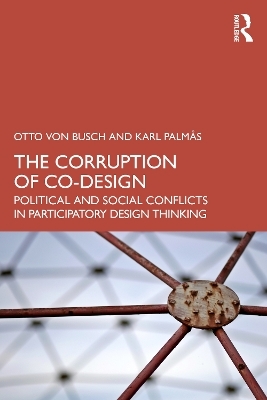
The Corruption of Co-Design
Political and Social Conflicts in Participatory Design Thinking
Seiten
2023
Routledge (Verlag)
978-1-032-25001-4 (ISBN)
Routledge (Verlag)
978-1-032-25001-4 (ISBN)
Using the notion of "Realdesign", as a parallel to Realpolitik, the authors aim to highlight political, social and methodological obstacles when designers turn to design thinking, participation and "living labs", with the hope of changing the world for the better.
Designers are often depicted as social change agents that serve the good in the world. Similarly, co-design tends to be described as a democratic mode of creativity that is somehow beyond reproach. But is change a virtue in itself, and do participatory practices always produce socially beneficial outcomes?
Such questions are becoming more pressing as co-design has emerged as a dominant practice in planning and urban design, while also informing corporate management and public administration. In this book, Otto von Busch and Karl Palmås suggest that designers tend to overemphasize the place of ideals in design, leaving them ill-equipped to deal with a social world of power-wielding and zero-sum games. Seeking to reorient the concerns of the Scandinavian tradition of participatory design, they suggest that co-design processes are rife with betrayals, decay, and corruption, and that designerly empathy has morphed into a new form of cunning statecraft.
In putting forward Realdesign as an alternative conception of design practice, von Busch and Palmås ask: What hard lessons about the social must today’s designers learn from realists like Machiavelli?
Designers are often depicted as social change agents that serve the good in the world. Similarly, co-design tends to be described as a democratic mode of creativity that is somehow beyond reproach. But is change a virtue in itself, and do participatory practices always produce socially beneficial outcomes?
Such questions are becoming more pressing as co-design has emerged as a dominant practice in planning and urban design, while also informing corporate management and public administration. In this book, Otto von Busch and Karl Palmås suggest that designers tend to overemphasize the place of ideals in design, leaving them ill-equipped to deal with a social world of power-wielding and zero-sum games. Seeking to reorient the concerns of the Scandinavian tradition of participatory design, they suggest that co-design processes are rife with betrayals, decay, and corruption, and that designerly empathy has morphed into a new form of cunning statecraft.
In putting forward Realdesign as an alternative conception of design practice, von Busch and Palmås ask: What hard lessons about the social must today’s designers learn from realists like Machiavelli?
Otto von Busch is Professor of Integrated Design at Parsons School of Design, The New School, New York. Karl Palmås is Associate Professor at Chalmers University of Technology, Gothenburg.
1. Introduction: The Problems of Participatory Design 2. The Realist Challenge: Power and Possibilities 3. Betrayal: Post-political Participation 4. Corruption: Design and Decay 5. Cunning: Mêtis and Designerly Statecraft 6. Hypocrisy: of virtue and vice 7. Closing Propositions: After Empathy, Realdesign
| Erscheinungsdatum | 13.01.2023 |
|---|---|
| Zusatzinfo | 6 Line drawings, black and white; 6 Illustrations, black and white |
| Verlagsort | London |
| Sprache | englisch |
| Maße | 152 x 229 mm |
| Gewicht | 220 g |
| Themenwelt | Naturwissenschaften ► Biologie ► Ökologie / Naturschutz |
| Naturwissenschaften ► Geowissenschaften ► Geografie / Kartografie | |
| Sozialwissenschaften ► Soziologie ► Spezielle Soziologien | |
| ISBN-10 | 1-032-25001-1 / 1032250011 |
| ISBN-13 | 978-1-032-25001-4 / 9781032250014 |
| Zustand | Neuware |
| Informationen gemäß Produktsicherheitsverordnung (GPSR) | |
| Haben Sie eine Frage zum Produkt? |
Mehr entdecken
aus dem Bereich
aus dem Bereich
Lehrbuch zu Grundlagen, Technologie und Praxis
Buch | Hardcover (2022)
Hanser (Verlag)
CHF 48,95


